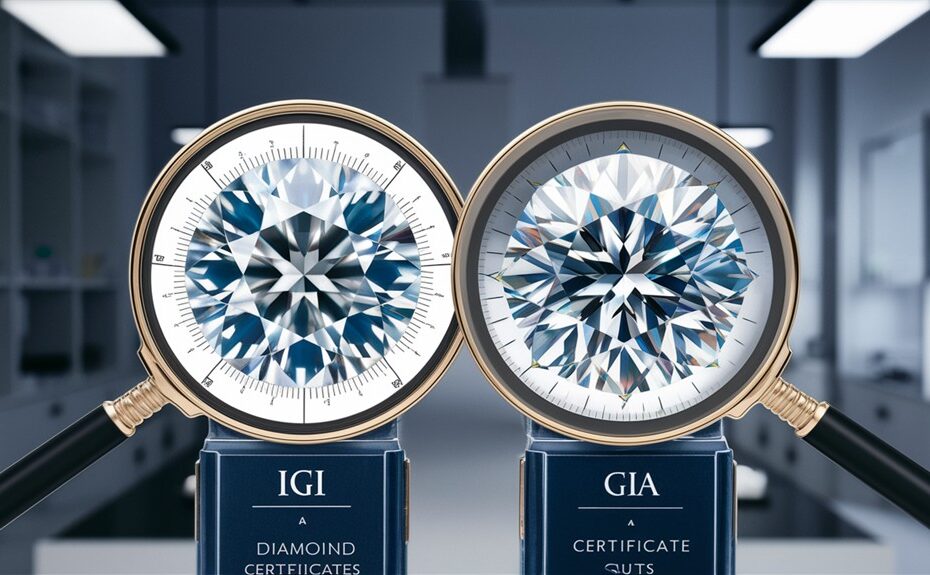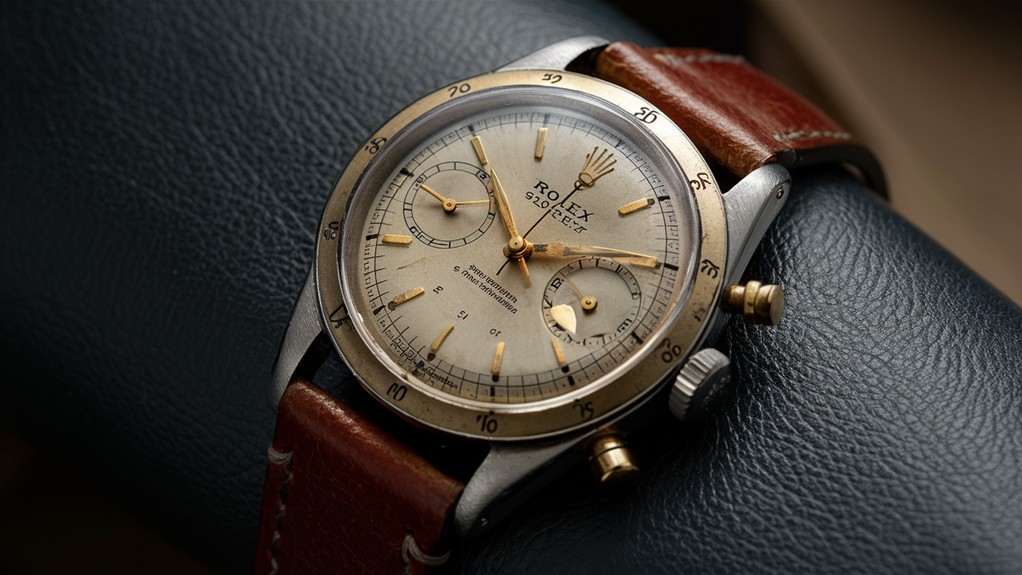When you're in the market for a diamond, you'll quickly encounter two major players in the certification game: IGI and GIA. As you navigate the sparkling world of gemstones in 2024, understanding the subtleties between these certifications can make or break your purchase decision. From grading standards to market perception, the differences between IGI and GIA certifications are more than just letters on a piece of paper. They can greatly impact the value, quality, and even the ethical considerations of your chosen diamond. But which certification should you trust, and why does it matter? The answer isn't as clear-cut as you might think.
Our Highlighted Points
- GIA is generally stricter in grading, leading to higher prices and resale values for their certified diamonds.
- IGI offers more affordable certifications, making them popular for online diamond purchases and budget-conscious buyers.
- Both labs show similar consistency in grading, challenging the perception that IGI is significantly more lenient.
- GIA certification is preferred for high-end sales and investment pieces, while IGI appeals to mid-range buyers.
- Both organizations certify lab-grown diamonds using the same criteria as natural diamonds, reflecting consumer interest in ethical sourcing.
Understanding IGI and GIA
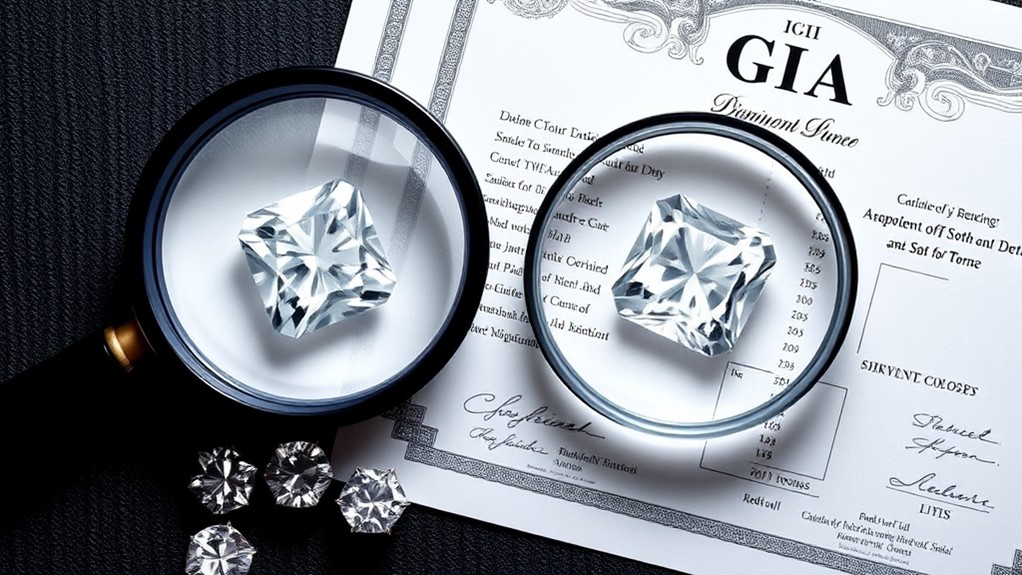
Two major players dominate the diamond certification landscape: IGI and GIA. These institutions have established themselves as leading authorities in diamond grading and certification, each with its own unique history and approach.
The International Gemological Institute (IGI), founded in 1975, has gained recognition for its extensive grading of diamonds, colored stones, and jewelry. Conversely, the Gemological Institute of America (GIA), established in 1931, is renowned for developing the widely-used 4 Cs grading system.
Both IGI and GIA provide diamond certificates that assess gemstones based on cut, color, clarity, and carat weight. However, GIA is often considered to have stricter grading standards, particularly in color and clarity assessments. This rigorous approach can result in higher resale values for GIA-certified diamonds compared to IGI certified diamonds.
IGI certifications are generally more accessible and budget-friendly, making them popular in online retail markets. For consumers prioritizing affordability, IGI-certified diamonds may be an attractive option.
It's essential to recognize that both organizations equally certify lab-grown diamonds using similar grading criteria as natural diamonds, reflecting the evolving transparency in the diamond market.
Certification Processes Compared
While both IGI and GIA are respected diamond certification authorities, their certification processes differ in several key aspects. When comparing these two institutions, you'll notice variations in their approaches to diamond grading and reporting.
GIA's certification process is known for its strict grading standards, particularly in color and clarity evaluations. Multiple expert gemologists are involved in the grading process, contributing to GIA's reputation for accuracy and consistency. Their reports are concise, focusing on crucial grading details of the 4 Cs: Cut, Color, Clarity, and Carat weight.
In contrast, IGI's certification process is more accessible and cost-effective. This approach often results in more lenient grading, especially for smaller diamonds and fancy shapes. IGI provides more detailed reports, including supplementary information on polish, symmetry, and fluorescence.
Both organizations evaluate diamonds based on the 4 Cs, ensuring thorough assessments for quality and authenticity. Moreover, they certify lab-grown diamonds using similar criteria as natural diamonds, reflecting the growing acceptance of these alternatives in the market.
When choosing between IGI and GIA certification, consider your priorities regarding grading strictness, report detail, and cost-effectiveness.
Grading Standards Analysis
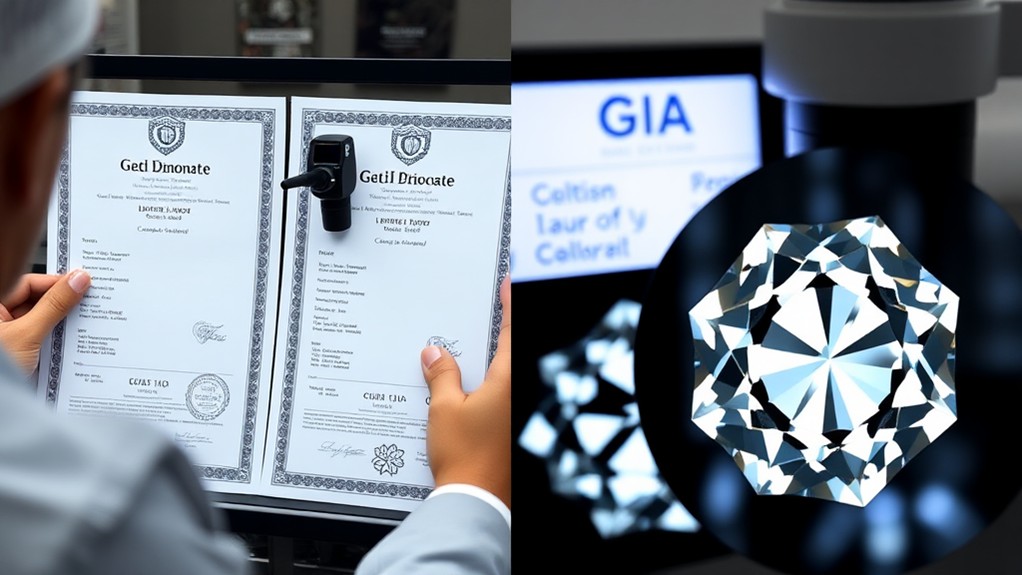
A thorough analysis of grading standards between IGI and GIA reveals surprising similarities, challenging common perceptions about their differences. When comparing these two prominent diamond certification services, you'll find that their grading consistency is remarkably close, especially in clarity grading. In fact, many industry experts have found that the differences in the grading standards between GIA and IGI are often exaggerated, leading to misconceptions about the quality of their diamond certifications. While there may be subtle variations in their criteria for color and cut grading, the overall consensus is that both GIA and IGI adhere to high standards in their evaluations. Therefore, it is important for consumers to look beyond the hype and consider the actual quality of the diamonds when making a gia vs igi diamond certification comparison.
Consider the following comparison:
| Aspect | IGI Stricter | GIA Stricter | Same Grade |
|---|---|---|---|
| Color | 12 instances | 7 instances | 10 cases |
| Clarity | 5 instances | 4 instances | 20 cases |
| Overall | Comparable | Comparable | Consistent |
While GIA is often perceived as having stricter grading standards, particularly for color and clarity, the data suggests that IGI's assessments are largely comparable. In fact, IGI demonstrated stricter color grading in more instances than GIA. For clarity grading, both labs showed significant agreement, with identical grades in 20 out of 29 cases.
Industry professionals should note that both IGI and GIA typically assign grades within one grade of each other, highlighting their general consistency in diamond grading. This analysis challenges the notion that IGI is consistently more lenient, emphasizing the importance of understanding the subtleties in diamond certification when making informed decisions.
Market Perception and Value
Market perception plays a significant role in shaping the value of diamond certifications. When comparing IGI and GIA, you'll find that GIA-certified diamonds generally command higher prices and enjoy greater market confidence. This disparity stems from GIA's reputation as the gold standard in diamond grading, with stricter standards that inspire consumer trust.
Consequently, GIA certifications are often preferred for high-end sales and significant investments in the luxury market.
In contrast, IGI certifications are perceived as less prestigious, which can impact a diamond's desirability and resale value. However, IGI appeals to budget-conscious buyers, offering more affordable options for fashion pieces or less expensive diamonds.
When considering diamond certifications, keep these key points in mind:
- GIA-certified diamonds are typically 12% more expensive than IGI-certified ones
- GIA is favored for investment-grade diamonds
- IGI is suitable for fashion jewelry and budget-friendly options
- Market perception strongly influences a diamond's value
- Consumer trust is higher for GIA certifications
Your choice between IGI and GIA should align with your priorities, whether you're seeking an investment piece or a more affordable option for everyday wear.
Lab-Grown Diamond Certifications
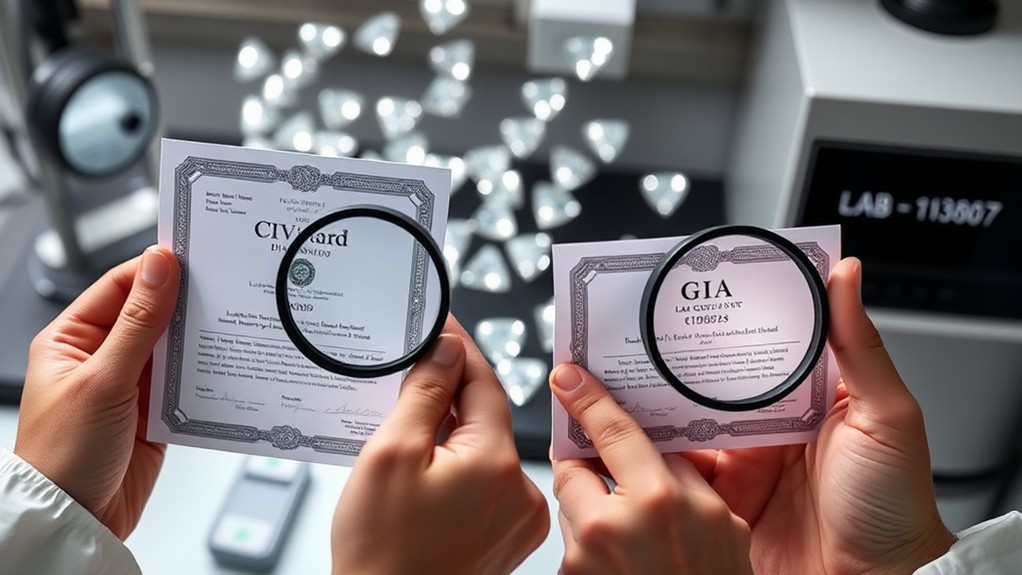
Lab-grown diamonds have taken off in recent years, prompting both IGI and GIA to expand their certification services to include these synthetic stones. These certifications provide transparency and consistency in quality assessment, using the same key criteria as natural diamonds: carat weight, cut, color, and clarity. GIA's lab-grown diamond certification adheres to rigorous standards, making it a trusted choice for high-value investments. IGI offers detailed reports, making it accessible for budget-conscious buyers.
| Criteria | IGI | GIA |
|---|---|---|
| Grading Criteria | Same as natural diamonds | Same as natural diamonds |
| Report Detail | Extensive | Extensive |
| Cost | More affordable | Premium pricing |
| Market Acceptance | High | Very high |
| Specialization | Broader range of gemstones | Focused on diamonds |
The prevalence of lab-grown diamond certifications reflects a shift in consumer preference towards ethically sourced and environmentally friendly options. Both IGI and GIA certifications guarantee that lab-grown diamonds meet the same quality standards as natural diamonds, providing confidence to buyers. When choosing between IGI and GIA for lab-grown diamond certification, consider your budget, the stone's value, and your personal preferences for report detail and market recognition.
Price Differences Explained
While both IGI and GIA offer certifications for lab-grown diamonds, their price differences can greatly impact your purchasing decision.
IGI-certified diamonds are typically 12% cheaper than their GIA counterparts, providing a significant financial advantage for budget-conscious consumers. This price disparity is particularly evident in excellent cut round diamonds, where IGI certifications consistently offer lower prices across different grades and sizes.
When comparing diamond certification options, consider the following:
- IGI diamonds are more affordable, especially in larger sizes
- GIA's stricter grading standards result in higher median prices
- Smaller selections of IGI diamonds are available in D-F color range
- More extensive inventory of IGI diamonds exists in G-J color spectrum
- Potential for substantial savings with IGI certification without compromising quality
The diamond grading system employed by each certification body influences these price differences.
GIA's reputation for rigorous standards often leads to higher prices, while IGI's more lenient approach results in lower costs.
As a consumer, you'll need to weigh the importance of certification prestige against potential savings. For those prioritizing budget-friendly options, IGI certification can offer excellent value, particularly in the mid-range color spectrum, without sacrificing crucial quality attributes.
Choosing Between IGI and GIA
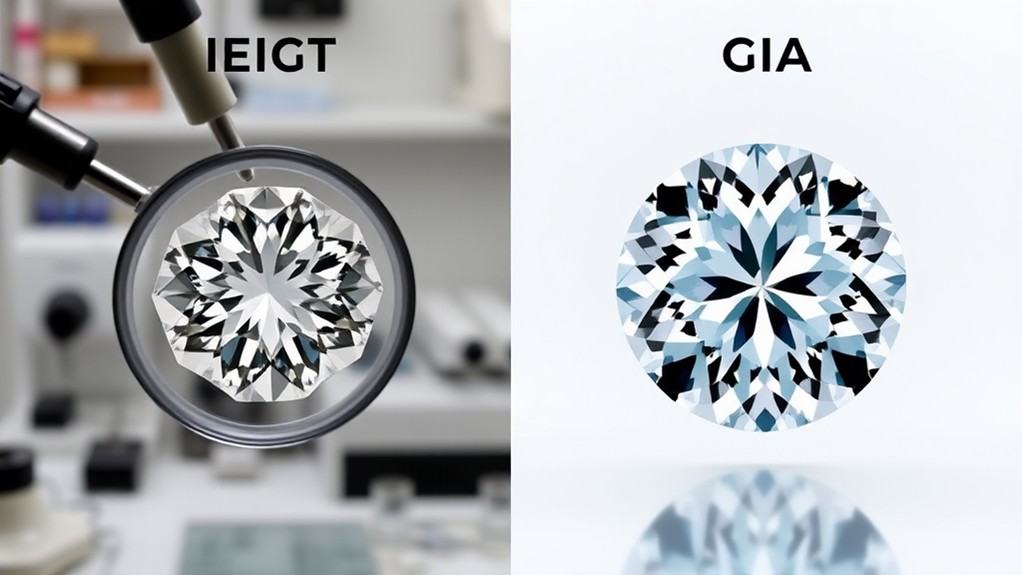
Choosing between IGI and GIA certification for your diamond isn't just about price; it's a decision that impacts value, quality assurance, and long-term investment potential. Consider these factors when making your choice:
- Investment value: GIA-certified diamonds generally command higher resale values as a result of stricter grading standards, making them ideal for high-value investments.
- Budget considerations: IGI offers more affordable certification options, appealing to budget-conscious buyers who still want quality assurance.
- Intended use: For investment pieces or high-end jewelry, GIA certification is often preferred. IGI certification suits fashion jewelry or less expensive items.
- Cost savings: IGI-certified diamonds are typically 12% cheaper than GIA-certified stones, offering considerable savings for cost-conscious consumers.
- Reputation: Both IGI and GIA maintain reputable grading practices, ensuring reliable diamond grading reports.
When choosing between IGI and GIA, prioritize your individual preferences and budget.
For long-term investments or high-value pieces, GIA's strict standards may justify the higher cost. However, if you're seeking quality assurance at a more affordable price point, IGI certification offers a practical alternative without compromising greatly on reliability.
Technology in Diamond Grading
Technology plays a pivotal role in modern diamond grading, revolutionizing the way both IGI and GIA evaluate precious stones. These leading certification institutes utilize advanced gemological equipment and sophisticated software to guarantee accurate grading and detailed assessments of diamonds.
By incorporating state-of-the-art technology into their grading methodologies, IGI and GIA have greatly improved the objectivity and reliability of their grading reports.
When you're considering a diamond purchase, it's crucial to understand the technological aspects that contribute to the grading process:
- Advanced imaging techniques for precise color and clarity analysis
- Specialized tools for measuring fluorescence under controlled conditions
- Cutting-edge software for evaluating cut quality and proportions
- High-precision instruments for determining exact carat weight
- Computerized systems for data management and report generation
The integration of technology in diamond grading by both IGI and GIA has transformed the jewelry industry, providing consumers with more accurate and consistent assessments.
These advancements have minimized human error and subjectivity, resulting in more reliable grading reports. As you compare certificates from IGI and GIA, you can trust that both organizations employ innovative technology to deliver objective and thorough evaluations of your chosen diamond.
Future Trends in Certification
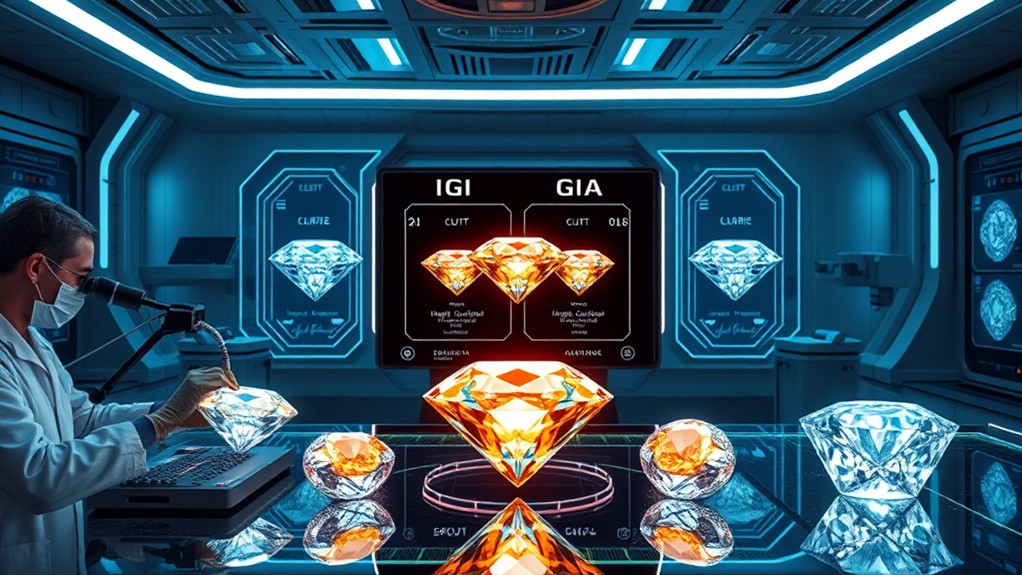
Looking ahead, the diamond certification landscape is poised for significant transformation. Both IGI and GIA are adapting their processes to accommodate the growing demand for lab-grown diamonds while maintaining transparent grading standards.
You'll likely see an increased focus on ethical sourcing and sustainability practices in certification reports, reflecting consumer priorities.
Advanced technology integration will reshape diamond certification:
- AI and blockchain implementation to improve grading accuracy
- Improved traceability for both natural and lab-grown diamonds
- Increased consumer confidence in certification authenticity
Market trends indicate that IGI and GIA will expand their educational initiatives to inform consumers about:
- Differences between natural and lab-grown diamonds
- Impact of certification on purchasing decisions
- Relevance of diverse grading criteria
Competition between certification bodies may drive innovations in:
- Report formats, providing more detailed and accessible information
- Grading methodologies to meet evolving consumer expectations
- Integration of digital tools for easier certificate verification
As the industry evolves, you can expect diamond certification to become more thorough, technologically advanced, and tailored to meet the demands of an increasingly informed consumer base.
Frequently Asked Questions
Is IGI Certification Better Than GIA?
No, IGI certification isn't generally considered better than GIA. While IGI is more affordable, GIA is stricter and more prestigious. Your choice depends on your budget and priorities. GIA's often preferred for investments, IGI for cost-conscious buyers.
Can IGI Be Trusted?
Yes, you can trust IGI. They're a reputable organization with decades of experience. While their standards may be slightly more lenient than GIA's, they provide reliable certifications using advanced technology and standardized grading systems for diamonds and gemstones.
Which Diamond Certificate Is the Best?
In terms of diamond certificates, GIA is widely considered the best. You'll find it's the most trusted and respected in the industry. It offers the strictest grading standards and provides the most detailed, reliable assessments.
What Is the Best Lab Diamond Certification?
For lab diamonds, you'll find GIA certification is the best choice. It's widely respected and offers strict grading standards. However, if you're budget-conscious, IGI certification provides a good alternative with thorough analysis at a lower cost.
